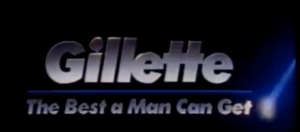
Gillette, the razor company, has created a new commercial, directed by a woman, encouraging men to be “the best they can be.”
It’s had over 19 million views now on YouTube within a few days and is stirring up controversy.
Scenes of men doing “the right thing” are either being embraced or not. Here’s the commercial:
Gillette’s Powerful
New #MeToo Era Commercial
Has People Talking
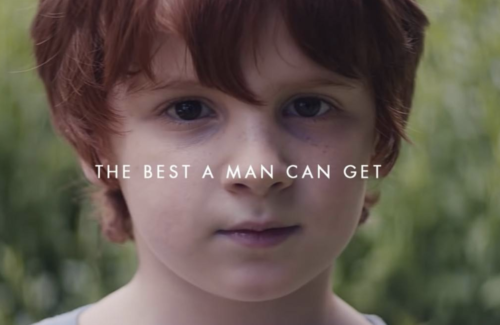
httpss://www.eonline.com/shows/peoples_choice_awards/news
by Johnni Macke,
Is this really the best a man can get?
That’s the question Gillette and the team over at Procter & Gamble (P&G) are asking in their new commercial and the world is waiting on an answer.
This week, Gillette released its newest commercial — that plays out more like a short film — in which the #MeToo movement is addressed, “boys will be boys” is no longer an acceptable reply and their 30-year slogan, “the best a man can get,” is brought into the modern era by twisting it to focus on “the best men can be.”
The commercial proves that toxic masculinity has gone on for too long by showing glimpses of bullying, harassment, “atta boy mentalities” and overall negative actions from boys and men. It’s these actions that have led to the current issues both men and women are facing on a daily basis.
Next, there are clips of men who are already acting “the right way,” which drives home the point that these sexist and inappropriate learned actions have been going on “far too long.” Luckily, that all stops today…at least for the Gillette team and ideally its customers.
With the release of this powerful video, Gillette caused quite a commotion. The idea that “the boys watching today will be the men of tomorrow” is both exciting and terrifying if things don’t begin to change.
By showing scenes of men doing the right thing, like calling off men who catcall women, ending kids fighting with other boys and showing that boys are looking up to the men of today, the company has made people stop and take note.
Some people have praised the brand for its ad and awareness of the current climate and negative attention men who are toxic have brought on all men, including Chrissy Teigen who took to Twitter to sing the brand’s praises.
“I’ve been using a men’s Gillette razor since I was 14. Gillette was the first major company to hire me when I was kind of known as a risky little b for brands. I still use a gillette fusion razor and I still get so much joy from a fresh blade. in closing, I love you, Gillette,” she shared on Tuesday.
Other customers and people in general however have voiced their anger at the overall message.
Negative comments include being called “sexist” or “preachy,” but that doesn’t mean Gillette or P&G as a whole is backing down in any way from their mission to educate men and boys on how to act in today’s world.
“As the world’s largest marketer to men, we knew that joining the dialogue on ‘Modern Manhood’ would mean changing how we think about and portray men at every turn,” Gary Coombe, president of P&G Global Grooming said in a press release on Monday.
“As a starting point, and effective immediately, Gillette will review all public-facing content against a set of defined standards meant to ensure we fully reflect the ideals of Respect, Accountability and Role Modelling in the ads we run, the images we publish to social media, the words we choose, and more. For us, the decision to publicly assert our beliefs while celebrating men who are doing things right was an easy choice that makes a difference.”
With more than four million views on YouTube and seven million views on Twitter since its release, Gillette’s video message is clearly being heard and the brand isn’t stopping there.
In addition to launching their new ad campaign and redefining their slogan, the brand has launched a new charitable program to promote the positive impact some men are making and continue to dismantle the “toxic masculinity” way of life throughout the country.
“Gillette believes in the best in men,” Coombe said. “By holding each other accountable, eliminating excuses for bad behavior, and supporting a new generation working toward their personal ‘best,’ we can help create positive change that will matter for years to come.”
This short film kicked off Gillette’s new venture to end this toxicity by taking action.
This includes the brand donating $1 million per year over the next three years to different non-profit organizations in the U.S. beginning with The Boys & Girls Club of America in 2019.
With so many eyes on them, it’ll be interesting to see what Gillette does next in their mission to end male toxicity and promote the “best” version of men.
“It’s only by challenging ourselves to do more that we can get closer to our best,” the commercial reads as it comes to a close and its message seems to be spot on.
To learn more about Gillette’s efforts in bringing about awareness and changing the post #MeToo culture, head to thebestmencanbe.org.
In the Youtube below, Rebel Wisdom voices their feelings about the overall message, explaining where they feel Gillette went wrong:
Gillette responds
to the backlash against
its woke viral ad
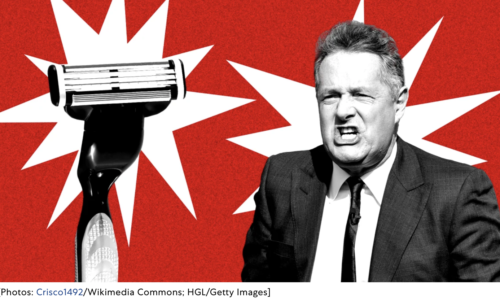
httpss://www.fastcompany.com/90293402/gillette-responds
By Joe Berkowitz, January 17, 2019, Fast Company
Although data reveals the social response to the ad has been generally positive, Fast Company spoke with Gillette’s brand about the ensuing controversy.
Gillette’s new ad urging men to be “the best a man can be” immediately succeeded in justifying its own existence.
If so many prominent adult men could be so triggered by the very suggestion that their gender might want to shave off some less desirable traits, well, obviously there’s some room for improvement.
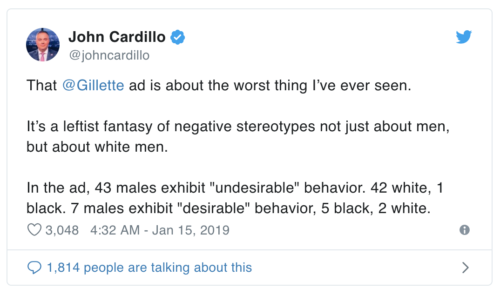
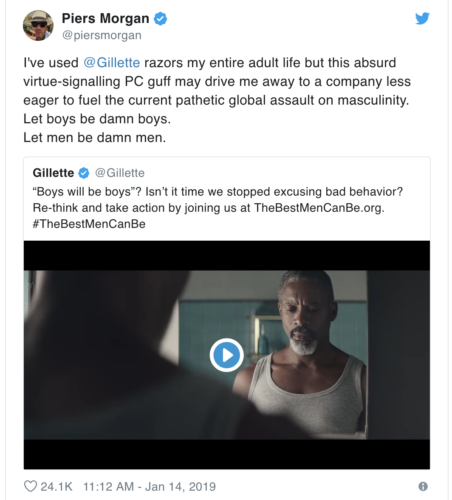
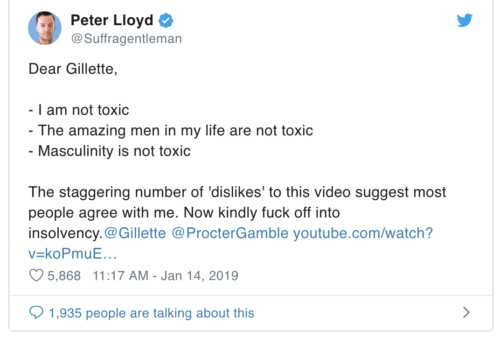
Just a couple days (and over 13 million views) after the ad’s debut, Gillette has been accused of everything from perpetuating a war against men to donning a cloak of wokeness in order to cash in on the progressive air of our current cultural climate.
However, just because the ad has provoked a divisive reaction doesn’t mean it was designed merely to generate brand awareness through chaos.
“We weren’t trying to court controversy,” says Gillette brand director Pankaj Bhalla. “We were just trying to upgrade the selling line that we’ve held for 30 years–the Best a Man Can Get–and make it relevant. I don’t think our intention was to have controversy just for the sake of controversy.”
The idea of giving more meaning, depth, and accountability to Gillette’s decades-old slogan led the brand to create a series of ads exemplifying what it’s dubbed “bestness” from every conceivable angle.
There’s the NFL spot with Shaquem Griffin, exploring how the one-handed Seahawks linebacker has achieved bestness against adversity, and there’s the YouTube ad for Gillette’s Treo razor, which showcases a middle-aged man taking care of his father (partly by shaving him). In the coming weeks, these ads will be joined by a new installment revealing what firefighters have to do to save lives.
But the centerpiece of the whole campaign thus far is the “Best a Man Can Be” ad.
As Bhalla explains it, this ad is directed toward good guys wondering what they can do to be great guys.
The answer provided involves standing up to bullies, not allowing physical violence, and respecting women through gender equality–and more importantly, role modeling this behavior for the next generation of men. (Literally putting money where its mouth is, the brand has pledged a million dollars a year in donations to youth organizations like The Boys and Girls Club of America.)
According to Fast Company’s consultation with social media analytics provider Sprout Social, the online response to the ad has been mostly positive.
Between January 14 and 16, 63% of the 645,000 tweets about @Gillette have been positive, and 94% of the 246,000 tweets hashtagged #TheBestMenCanBe have been positive.
Of course, the ad also made some men feel attacked. (To be fair, it takes very little for them to feel that way.) For the most part, these men are responding to the perceived assault in the usual manner: with threats of a boycott and the prospect of razor-clogged toilets.
In the dingier corners of the internet, though, the opposition has resorted to doxxing the ad’s director, a woman. The ramifications of this response are not lost on Gillette.
The brand remains resolute behind its intentions, though, even in the face of outrage and outrageous overreaction.
“I wouldn’t say any of the response is not expected.
Masculinity is a complex and layered topic, so we definitely expected debate and conversations,” Bhalla says. “I want to be respectful to the folks who didn’t necessarily like the ad and had a point of view on it–they are absolutely entitled to it.
But the ad is not about all men being bad. It’s the exact opposite of that. There’s a part where we say, ‘We believe in the best in all men.’
It’s literally right there in the ad!
The intention is to say, ‘All of you guys are great; how about you be an even better role model for your kids?’ That’s it. That’s the ad.
Bhalla and Gillette’s explanation of the thinking behind the ad seems plausible enough, but there is one alternative theory that places the ad in a larger context, and it’s a theory that’s worth exploring.
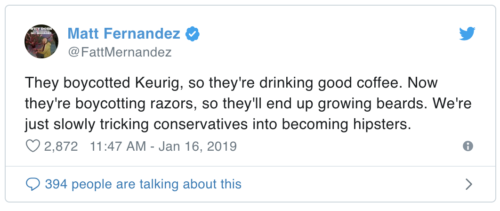
I invoke the Mother, Her Infinite Grace,
and Dispensation of Grace for
human relationships.

